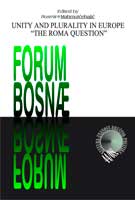WESTERN HOSTILITY TOWARD THE MUSLIMS: A HISTORY OF THE PRESENT
WESTERN HOSTILITY TOWARD THE MUSLIMS: A HISTORY OF THE PRESENT
Author(s): Tomaž MastnakSubject(s): Cultural history
Published by: Međunarodni forum Bosna
Summary/Abstract: Relations between Islamic and Christian societies have for so much of their history been marked by hostility, that hostility seems to have been their unchanging characteristic. That gives the impression that hostility is the fate of the relations between Christians and Muslims. One can dispute such a view by pointing to instances of their peaceful, or even friendly, coexistence and cooperation. Such an approach, however, runs the risk of idealizing those instances. A typical case in point is Medieval Spain or, on a more individualized level, figures praised as advocates of tolerance, dialogue, and diversity. The graver problem with such an approach seems to me to lie in the failure to answer the question of why such positive instances failed and have sunk into oblivion, why they have so far been inconsequential. They may represent an “other” or “hidden history,” but they did not make history. I will focus on the changing nature of Western hostility toward the Muslim world rather than on the moments of its absence. It is important to note that the nature of that hostility has been changing. If there is hope, this gives us hope. The main question I want to address is how Western Christians’ hostility towards the Muslims has differed over time and how it has also differed from their hostility toward other peoples and societies. Instead of ascribing the reason for mutual hostility to the assumed nature of Islam and Christianity or of societies presumably organized in accordance with their precepts, one should look into contingent, political factors that, at a given time, shape Muslim-Western relations in general and the expressions of their hostility in particular. In this paper, I focus on one side of these relations. By this I do not want to imply that the other was innocent of producing hostility. (I believe, though, that historical evidence demonstrates that the Muslims were more often than not the victims of unprovoked Western violence). I point to internal dynamics in the West that generated or reproduced specific forms of hostility toward the Muslim world. I will take a very long view of this issue, because I believe such an approach can best help us understand the historical background of today’s Islamophobia. I hope that the generalizations and simplifications this approach is bound to produce will stimulate debate rather than derail it.-
Journal: Forum Bosnae
- Issue Year: 2008
- Issue No: 44
- Page Range: 235-301
- Page Count: 67
- Language: English
- Content File-PDF

